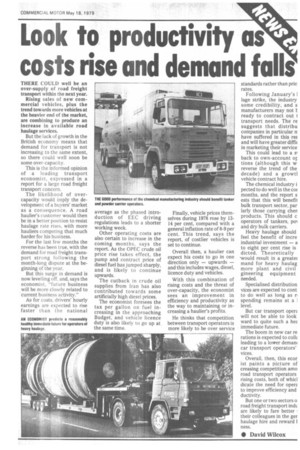Look to productivity as costs rise and demand falls
Page 29

If you've noticed an error in this article please click here to report it so we can fix it.
THERE COULD well be an over-supply of road freight transport within the next year.
Rising sales of new commercial vehicles, plus the trend towards more vehicles at the heavier end of the market, are combining to produce an increase in available road haulage services.
But the lack of growth in the British economy means that demand for transport is not increasing to the same extent, so there could well soon be some over-capacity.
This is the informed opinion of a leading transport economist, expressed in a report for a large road freight transport concern.
The likelihood of overcapacity would imply the development of a buyers' market as a consequence. A road haulier's customer would then be in a better position to resist haulage rate rises, with more hauliers competing that much harder for his business.
For the last few months the reverse has been true, with the demand for road freight transport strong following the month-long dispute at the beginning of the year.
But this surge in demand is now levelling off, and, says the economist, "future business will be more closely related to current business activity."
As for costs, drivers' hourly earnings are expected to rise faster than the national average as the phased introduction of EEC driving regulations leads to a shorter working week.
Other operating costs are also certain to increase in the coming months, says the report. As the OPEC crude oil price rise takes effect, the pump and contract price of diesel fuel has jumped sharply, and is likely to continue upwards.
The cutback in crude oil supplies from Iran has also contributed towards some artificially high diesel prices.
The economist foresees the tax per gallon on fuel increasing in the approaching Budget, and vehicle licence duty is also likely to go up at the same time. Finally, vehicle prices themselves during 1978 rose by 1314 per cent, compared with a general inflation rate of 8-9 per cent. This trend, says the report, of costlier vehicles is set to continue.
Overall then, a haulier can expect his costs to go in one direction only — upwards — and this includes wages, diesel, licence duty and vehicles.
With this combination of rising costs and the threat of over-capacity, the economist sees an improvement in efficiency and productivity as the way to maintaining or increasing a haulier's profits.
He thinks that competition between transport operators is more likely to be over service standards rather than pric rates.
Following January's I lage strike, the industry some credibility, and s manufacturers may not I ready to contract out i transport needs. The re suggests that distribu companies in particular n have suffered in this res and will have greater diffh in marketing their service This could lead to a s, back to own-account or tions (although this w reverse the trend of the decade) and a growtl vehicle contract hire.
The chemical industry i pected to do well in the col months, and the report s ests that this will benefit bulk transport sector, par Early those carrying cher products. This should c operators of tankers, pea and dry bulk carriers.
Heavy haulage should feel the benefit of mere industrial investment — a to eight per cent rise is dieted. Theoretically would result in a greater mand for heavy haulag more plant and civil gineering equipment needed.
Specialised distribution vices are expected to cont to do well as long as r spending remains at a I level.
But car transport operz will not be able to look ward to quite such a he immediate future.
The boom in new car re rations is expected to collz leading to a lower demam car transport operators' vices.
Overall, then, this ecor ist paints a picture of creasing competition amo road transport operators rising costs, both of whicl dicate the need for opera to improve efficiency and ductivity.
But one or two sectors o road freight transport indt are likely to fare better their colleagues in the ger haulage hire and reward I ness.
• David Wilcox




















































































































